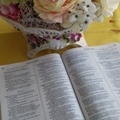[This is one in a series of devotional reflections prepared for Horley Baptist Church during November 2023]
As a general rule we tend to prefer those situations or products with which we are familiar. We tend to shop in those stores where we know the layout of the shelves, at a restaurant we often chose menu items that we recognise and we even like to listen to sermons when we have some idea of what the preacher is on about. When we do explore new places we are reassured by having an established place to which we can return.
Relatively few of us have had the experience of being deprived of access to the place that we call home. On those occasions when it has happened to me I was consoled by the knowledge that the problem was only temporary. Consider then the plight of those who have been permanently deprived of their homes and have nowhere to go.
Images of those who are homeless, refugees from war zones, victims of flood or famine, all appear on our tv screens with disturbing frequency. Nor are they situations that occur at a safe distance – somewhere ‘over there’. There are people who are facing these problems in our midst, here and now.
In the global context, this is nothing new. We recall how Jacob left home to avoid a hostile domestic situation, how the residents of Jerusalem were forced into exile in Babylon, and even how the young Jesus became a refugee fleeing to Egypt. They did not know what awaited them but staying-put was not an option for them.
In Genesis we read:
The Lord had said to Abram, “Leave your native country, your relatives, and your father’s family, and go to the land that I will show you.” Genesis 12 v1 [NLT]
Abram may not have known where he was going but he had confidence in the one who was organising the journey. To what extent are we willing to trust the one who is overseeing our journey through life?
Abram was a wealthy man, he had servants and livestock so he had the resources to be able to settle comfortably wherever God would lead him. Yet he was not content; the one thing that he desired the most was missing – an acceptable heir.
We sing the words “All I have needed thy hand has provided”[1] but do we believe it? Are there times when we wonder whether ‘all’ actually means all? Perhaps we think that something is missing, something that would make life more complete, something that God is holding back.
The antidote to those thoughts is to remember those fellow-travellers whose lifetime of memories, achievements and ambitions have been reduced into one item of hand luggage. For all of us the future is unknown. We plan and build, only to have it snatched away. Heed the words of Jesus:
Do not store up for yourselves treasures on earth, where bombs and bullets destroy, and where bailiffs break in and steal. … For where your treasure is, there your heart will be also. Matthew 6 v19, 21
Resources:
[1]: ‘Great is Thy Faithfulness’, Thomas Chisholm, 1923
Bible quotations: Unless otherwise specified, quotations are taken from the resources of Bible Gateway or Bible Hub, in accordance with the licencing conditions outlined on our Site Policies page.
Bible dates:
Where appropriate, the dates given for Biblical events are based on the Bible Timeline resource
and are subject to the constraints defined on the corresponding webpage.
 Horley Baptist Church online
Horley Baptist Church onlineHBC main site
Confidential prayer link
Link to Recent Reflections
Link to Index of Bible Passages
Last week’s reflection: A Stranger No More
Contributed by Steve Humphreys; © Steve Humphreys

Hi Steve,
An interesting and appropriate reflection. An interesting alteration of
some of the words in Mathew ch 6 but relevant for present circumstances in the Ukraine and Israel.
Stephen. Which version is this? Sometimes bailiffs have every right to repossess what you have and do NOT steal! This is a stupid and clumsy attempt at scripture! Bombs and bullets What rubbish!¬
Bernard,
If you were living in eastern Ukraine or Gaza then bombs and bullets would be a much more present threat than moths and vermin. As for bailiffs, yes they do have such rights but I chose them as symptomatic of financial distress of whatever cause. Anyway, being controversial certainly has boosted the readership!
A very relevant and challenging reflection Steve.